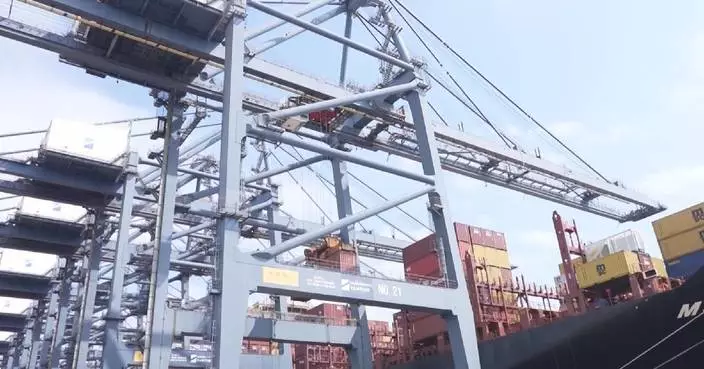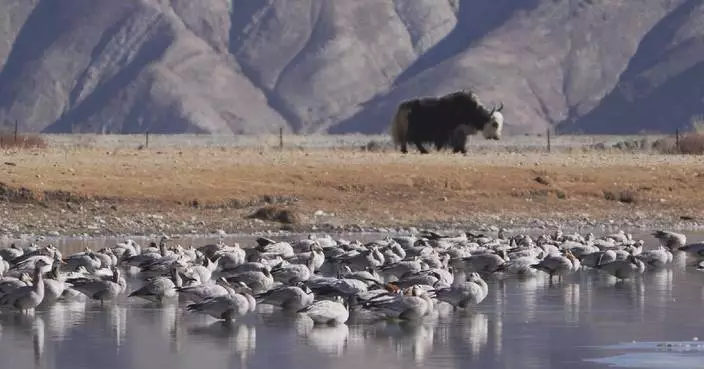Airports across China are required to closely monitor winter bird migration patterns and reinforce bird deterrent measures to ensure the safety of air travels, said an official of the Civil Aviation Administration of China (CAAC) on Friday.
At a press conference in Beijing, Shu Mingjiang, security director of the CAAC, stated that the CAAC has long conducted safety assessments and risk investigations on flight operations in accordance with China's civil aviation laws and regulations, as well as relevant international civil aviation standards. The CAAC promptly issues safety risk warnings to airlines that may be affected and adjusts flight routes to ensure safe operations. In addition, efforts have been strengthened to mitigate the risk of bird strikes.
"We have urged airports to closely monitor winter bird migration patterns, enhance bird deterrent measures both within airport grounds and the surrounding areas, and improve the effectiveness of bird strike prevention. This will involve strengthening the use of scientific and technological solutions to increase the accuracy of bird strike prevention and improve the identification of bird strike residues. Tailored prevention strategies will be developed based on the specific conditions of each airport and the behavior of local bird species, aiming to enhance the efficiency of bird strike mitigation efforts," said Shu.
Shu stated that the CAAC has also required thorough inspections to identify and address potential runway safety hazards, and enhanced emergency drills will further boost the efficiency of response measures.
According to the relevant data of the CAAC, there were no transport aviation accidents in China's civil aviation sector in 2024.

Chinese aviation regulator requires airports to strengthen bird deterrent measures
With dramyin lute and cymbals in hand and dressed in colorful traditional costume, 17-year-old Tenzin Norbu is among the proud youngsters in southwest China's Xizang Autonomous Region who have been helping preserve the centuries-old Tibetan opera, a multifaceted representative of Tibetan art and cultural heritage. Considered a living fossil of Tibetan culture, Tibetan opera is a comprehensive art combining folk songs, dance, storytelling, chant, acrobatics and religious performance. It was included on the UNESCO Representative List of the Intangible Cultural Heritage of Humanity in 2009.
Tenzin grew up listening to Tibetan opera along with his grandmother. The beat of the drum marked the rhythm of his childhood and quietly planted the seed of a dream.
The teenager leads a youth Tibetan opera troupe and guides his peers onto the very stage they once only dreamed of. He named it "Phudor Youth Tibetan Opera Troupe", because "Phudor" means "dream" in the Tibetan language.
"There are about 24 members in the troupe," said the teenager.
Tenzin once received a very special invitation to perform Tibetan opera for the opening ceremony of an art festival in Lhasa.
Although both their parents and teachers felt it's important for the children to be exposed to traditional culture from a young age, they didn't want it to affect their schoolwork.
The performance they were getting ready for was the first Sweet Tea House Art Festival, the troupe's very first public appearance. It's a rare opportunity for the children -- one too precious for them to pass up. But with their parents growing anxious about preparation for the performance eating into valuable study time, the children opted to rehearse in secret at weekends. Tenzin's family runs a tailor's shop. His father, who is hearing- and speech-impaired, is a superb tailor, while his mother helps him out by dealing with customers. Tenzin enjoyed Tibetan opera with his grandmother during childhood and later learned more about it from his uncle.
"Whenever I'm not feeling good, I'll take out the dramyin lute and the cymbals. When I hear the drumbeat, I get a feeling of elation that's simply indescribable," he said.
When Tenzin finally stepped onto the stage at the festival, he noticed that his parents were not in the audience. "My parents didn't have time to come to see my performance. But they always support me. They work hard every day, also for my sake. So, I'm happy whether they were here or not as long as I can keep performing Tibetan opera," said the youngster, believing that his passion for Tibetan opera will last a lifetime.

Childhood dream takes local boy onto Tibetan opera stage






















































